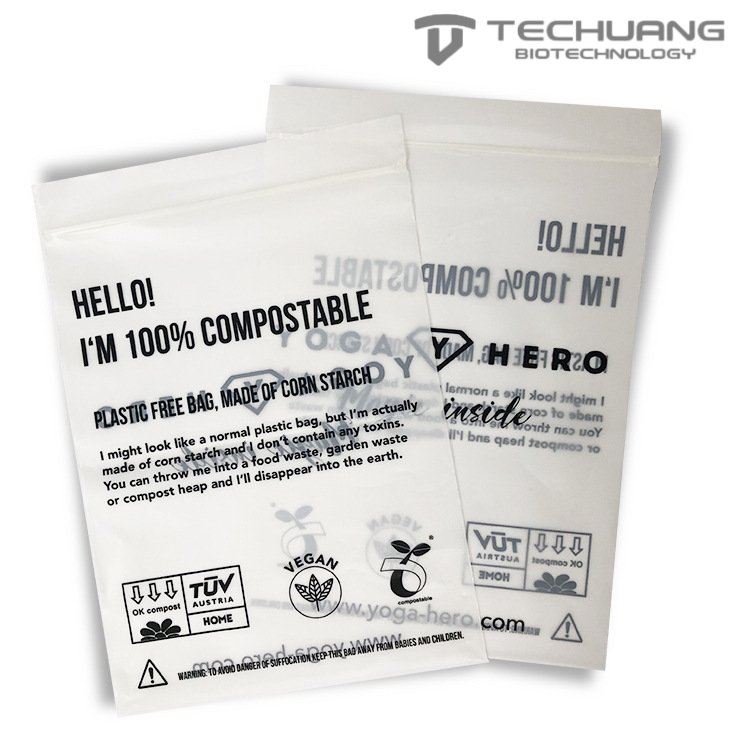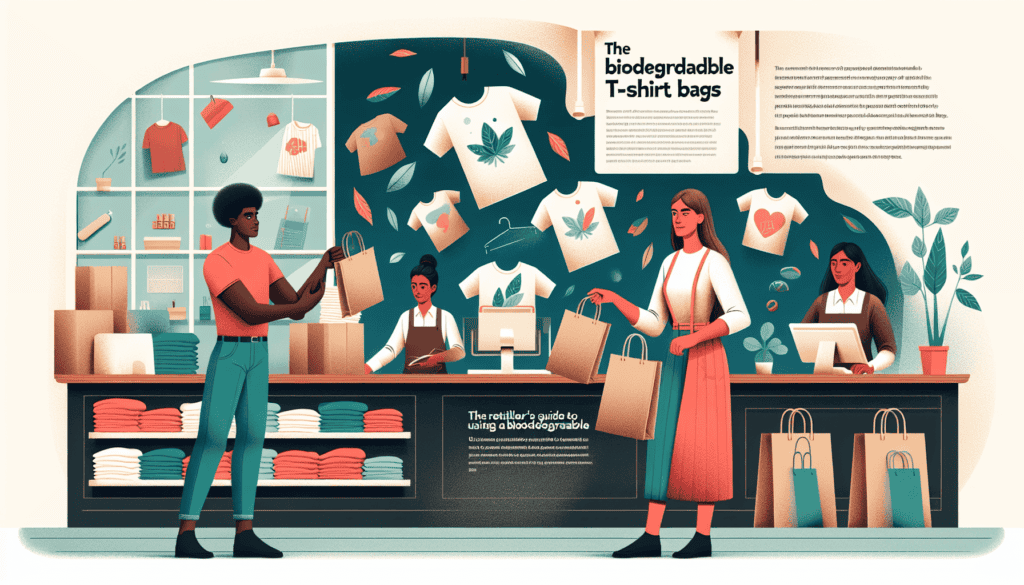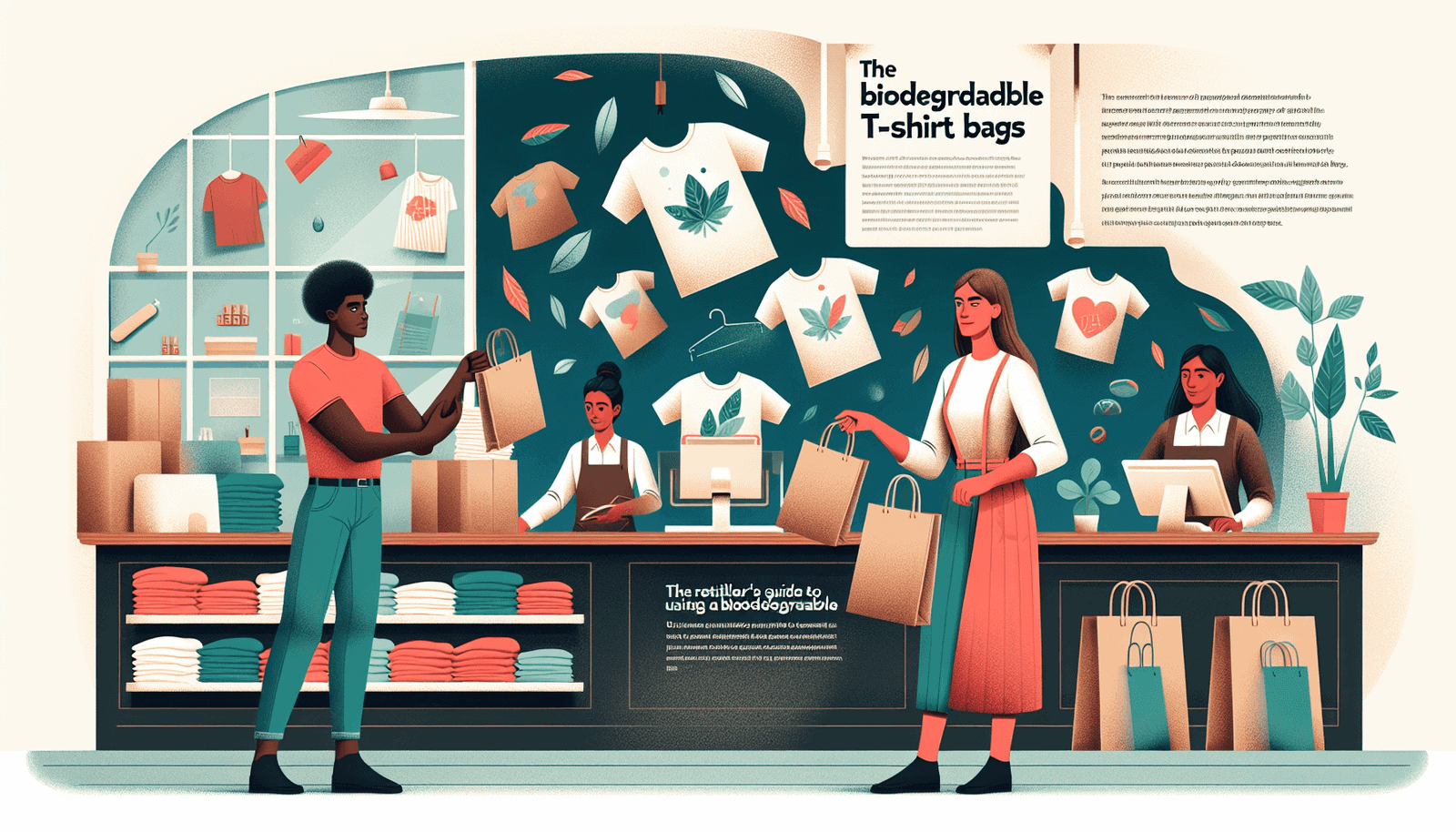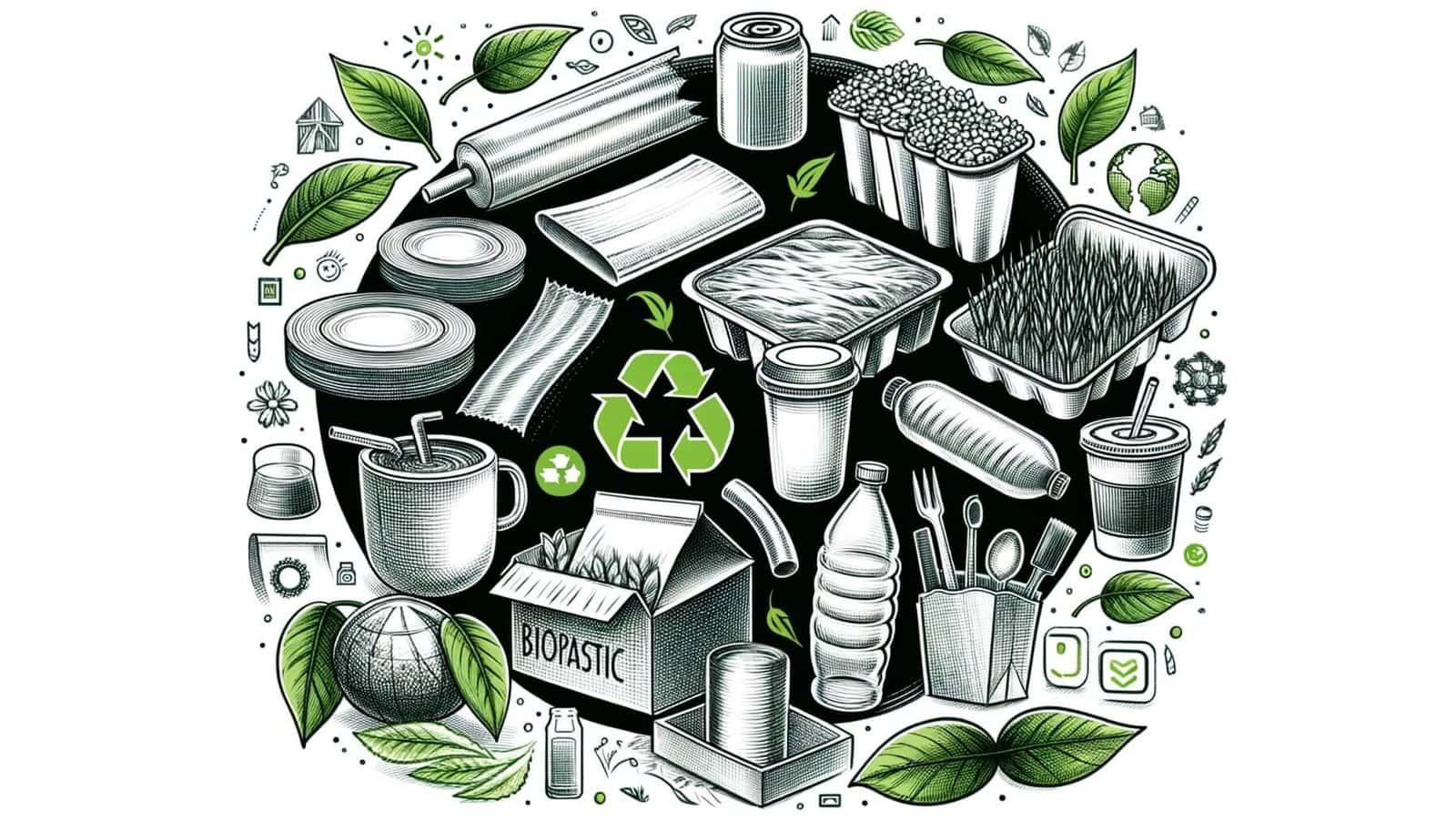In today’s eco-conscious market, retailers have a unique opportunity to appeal to environmentally aware consumers by utilizing biodegradable T-shirt bags. These eco-friendly alternatives to traditional plastic bags are made from natural or synthetic fibers, offering the same practical benefits while significantly reducing plastic waste in oceans and landfills. By harnessing the benefits of compostable packaging, you can not only diminish your carbon footprint but also cater to a growing demographic that favors sustainable practices.
Opting for biodegradable bags, such as those offered by Techuang Biotechnology, presents a twofold advantage: contributing to environmental preservation and enhancing customer satisfaction through eco-friendly retailing. These durable, recyclable, and trendy bags made from materials like cotton, bamboo, and jute, position your brand as a leader in the move towards sustainability. Additionally, by adopting biodegradable garment bags, retailers can gain a competitive edge, ensuring compliance with evolving legislation and preparing for a future where sustainability is not just preferred but expected.
Environmental Impact and Sustainability
Biodegradable T-shirt bags offer a significant advantage for retailers aiming to enhance customer satisfaction and mitigate environmental impact. Here’s how:
- Eco-Friendly Material: Made from renewable and biodegradable materials, such as corn starch, PLA, and PBAT, these bags provide a practical alternative to traditional plastic, supporting the reduction of plastic waste and aligning with consumer demand for sustainable choices 73.
- Benefits of Switching:
- Reduced Environmental Impact: By decreasing plastic waste, these bags contribute positively to marine life conservation and reduce landfill contribution, with a high decomposition rate and no harmful chemical release.
- Customer Attraction: Retailers using eco-friendly alternatives like biodegradable T-shirt bags can attract and retain customers who prioritize sustainability, enhancing brand reputation.
- Sustainability and Compliance: Biodegradable T-shirt bags are not only eco-friendly but also ensure compliance with evolving legislation on plastic use. By adopting these bags, retailers prepare for a future where sustainability is expected, thus gaining a competitive edge.
Retailers leveraging the benefits of biodegradable garment bags can thus achieve both customer satisfaction and environmental impact goals.
Cost-Effectiveness for Retailers
Embracing biodegradable T-shirt bags offers a multitude of cost-effective benefits for retailers, making them an attractive choice for businesses aiming to balance sustainability with economic viability.
- Durability and Reusability: Non-woven T-shirt bags, crafted from natural or synthetic fibers bonded together, stand out for their durability and reusability. This inherent strength ensures they can be used multiple times, significantly reducing the need for frequent replacements and thereby offering long-term saving.
- Customization and Marketing: These bags serve as a canvas for branding opportunities. Retailers can customize them with logos, slogans, and promotional messages. This not only aids in marketing efforts but also enhances brand visibility at a low cost. Importantly, the bags’ eco-friendly nature aligns with the growing consumer demand for sustainable products, potentially increasing customer loyalty and satisfaction.
- Economic Viability: Despite a potentially higher upfront cost, the long-term economic benefits of using non-woven T-shirt bags are clear. Their reusability leads to cost savings over time, and their affordability, especially when purchased in bulk, makes them a cost-efficient choice compared to alternatives like cloth or paper bags. Furthermore, with approximately 60-70% of US consumers willing to pay more for sustainable packaging, retailers can leverage this willingness to offset any initial costs, thereby aligning business strategies with consumer expectations for sustainability.

Enhancing Brand Image and Responsibility
In the realm of retail, the choice of shopping bags goes beyond mere functionality. Biodegradable T-shirt bags, in particular, offer a unique amalgamation of brand enhancement and environmental stewardship. Here’s how:
- Brand Visibility and Recognition:
- Customizing biodegradable T-shirt bags with your logo, slogan, or brand message turns each bag into a walking advertisement. This visibility is crucial in crowded marketplaces.
- High-quality, customized bags are perceived as an extension of product quality, positively influencing consumer perception and loyalty.
- Color schemes on bags can significantly impact consumer emotions and sales, creating a memorable shopping experience.
- Environmental Responsibility and Customer Loyalty:
- Demonstrating a commitment to sustainability through the use of eco-friendly bags aligns with the values of a growing consumer base that prioritizes environmental impact.
- Retailers offering their own branded reusable bags not only contribute to reducing plastic waste but also foster a sense of community among their customers, encouraging repeat business.
- Competitive Edge and Compliance:
- Adopting biodegradable garment bags positions a retailer as forward-thinking and responsible, attributes highly valued by today’s consumers.
- Compliance with evolving sustainability legislation ensures future readiness, avoiding potential legal hurdles and fines.
By integrating biodegradable T-shirt bags into their operations, retailers can significantly enhance their brand image, foster customer loyalty, and affirm their commitment to environmental responsibility.
Customer Preference and Loyalty
In today’s market, understanding customer preferences is key to fostering loyalty and enhancing satisfaction. Here’s how biodegradable T-shirt bags align with consumer demands and drive loyalty:
- Sustainability as a Priority:
- Consumer Demand: A significant shift towards sustainable packaging has been observed, with consumers across all generations willing to spend more for products that are environmentally friendly.
- Influence of Generations: Gen Z, in particular, has been a driving force, influencing not only their peers but also older generations like Gen X and Boomers to prefer sustainable shopping options.
- Retailer Response: By adopting biodegradable garment bags, retailers can align with these consumer preferences, thereby enhancing customer satisfaction and loyalty.
- Convenience and Innovation:
- Features Consumers Love: Features such as collapsibility and built-in compartments for produce make these bags highly convenient for shoppers.
- Application Across Retail: These bags are versatile, finding applications in retail stores, supermarkets, grocery stores, and even restaurants for takeout orders, catering to a broad spectrum of consumer needs.
- Regulatory Alignment and Market Edge:
- Shaping Regulations: Consumer demand for sustainable options is influencing packaging regulations, making it crucial for retailers to stay ahead of the curve.
- Competitive Advantage: Retailers leveraging the appeal of biodegradable T-shirt bags not only meet customer expectations but also gain a competitive edge by demonstrating environmental responsibility and future readiness.
By focusing on these aspects, retailers can significantly boost customer loyalty and satisfaction, ensuring their brand remains relevant and preferred in an increasingly eco-conscious market.
Legislative Compliance and Future Readiness
Navigating the evolving landscape of Extended Producer Responsibility (EPR) legislation is crucial for retailers looking to stay ahead in the sustainable packaging domain. Here’s a breakdown of how EPR laws across various states are shaping the future of retail packaging:
- State-Specific EPR Legislation:
- Maine, Oregon, Colorado, and California have each passed EPR bills focusing on packaging, with each state setting specific goals and requirements for recycling rates and packaging sustainability.
- These laws mandate that companies selling packaged products must fund a statewide recycling system, significantly impacting how retailers manage their packaging choices.
- Impact on Retailers:
- Producer Responsibility Organization (PRO): Retailers will need to collaborate in forming or joining a PRO to manage and fund the recycling system.
- Compliance and Cost Savings: By aligning with EPR legislation, retailers can not only ensure compliance but potentially save on the costs associated with packaging waste management.
- Truth in Labeling: EPR laws also emphasize accurate labeling, pushing retailers towards more honest communication about the compostability and biodegradability of their packaging.
- Future Readiness:
- Adapting to New Regulations: With new enforcements and regulations expected in 2023, retailers must stay informed and adaptable to meet these changing standards, focusing on compostable and biodegradable packaging.
- Global Influence: The Paris Climate Agreement encourages changes that trickle down to national and industry levels, promoting biodegradable packaging and influencing retailer practices worldwide.
This legislative landscape offers a unique opportunity for retailers to not only comply with current laws but also to gain a competitive edge by embracing biodegradable garment bags, enhancing customer satisfaction, and minimizing environmental impact.
In Summary
Retailers can significantly enhance their competitive edge and customer satisfaction by integrating biodegradable garment bags into their operations. Here are the key factors:
- Durability and Multiple Uses:
- Biodegradable T-shirt bags are not just eco-friendly; they’re built to last. Their design accommodates heavy loads and protects products from environmental factors like moisture, making them a smart investment for businesses.
- Examples include their use as convenient trashcan liners, showcasing their versatility and durability.
- Customer Satisfaction and Environmental Impact:
- The transition to these bags helps decrease the reliance on single-use plastic bags, aligning with consumer trends towards sustainable living.
- Features such as built-in compartments for produce and the rise of collapsible bags highlight innovation in reusable shopping bags, further promoting sustainability and convenience for customers.
- Choosing and Maintaining Reusable Bags:
- To choose the best bag, consider material durability (like canvas or jute) and avoid plastic or synthetic materials. Size and style should match shopping needs, with a preference for companies practicing eco-friendliness.
- Regular washing and proper storage of bags ensure their longevity, contributing to a decrease in litter and pollution.
FAQs
Why Should Retailers Consider Switching to Biodegradable Bags?
Biodegradable bags offer a sustainable alternative to traditional packaging by minimizing reliance on fossil fuels and non-renewable resources. They are crafted from organic materials, which significantly lessen the environmental footprint by reducing land, water, and air pollution. These products are designed to be reused and recycled, contributing to waste reduction efforts.
What Are the Key Advantages of Biodegradable Plastics?
Biodegradable plastics bring forth several significant benefits:
- They generate fewer emissions during both production and decomposition.
- Their manufacturing process is more energy-efficient compared to conventional plastics.
- They contribute to reducing the volume of waste, as they decompose more rapidly.
- The inevitable depletion of petroleum resources underscores the need for alternatives like biodegradable plastics.
- These plastics break down much faster than traditional plastics.
- They avoid the use of harmful chemicals, making them safer for the environment and human health.








